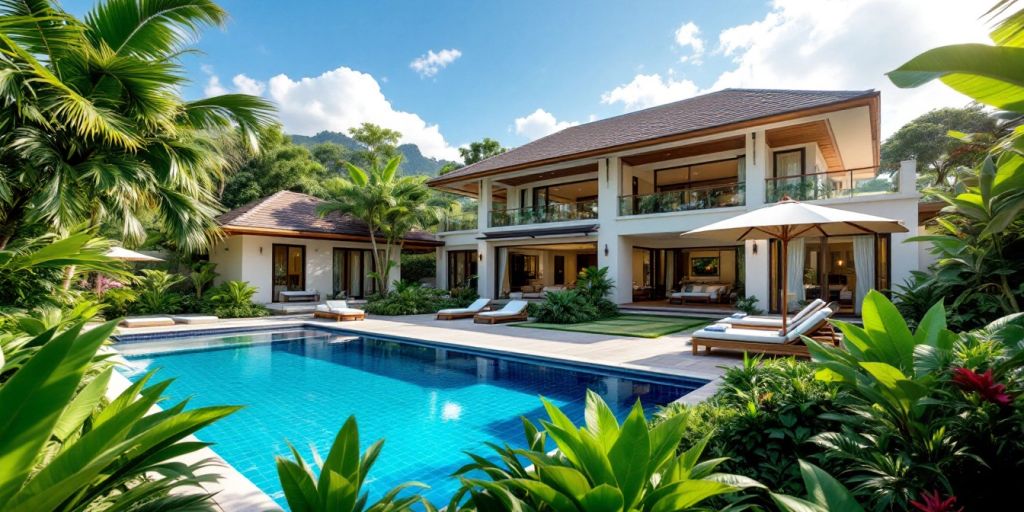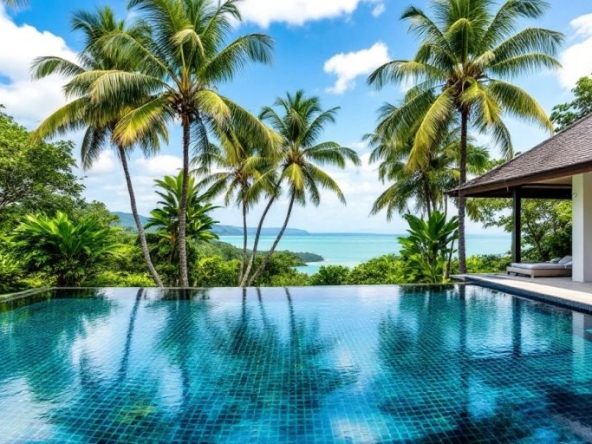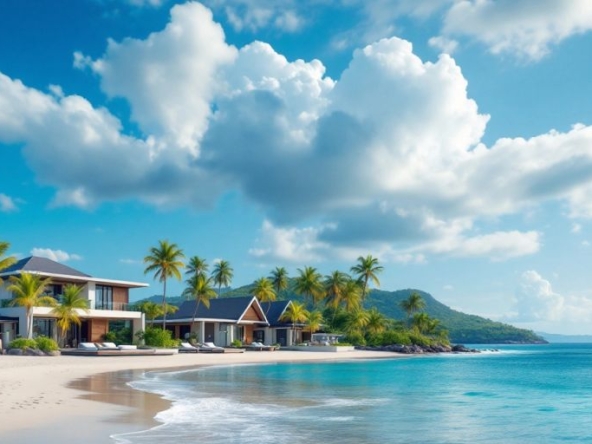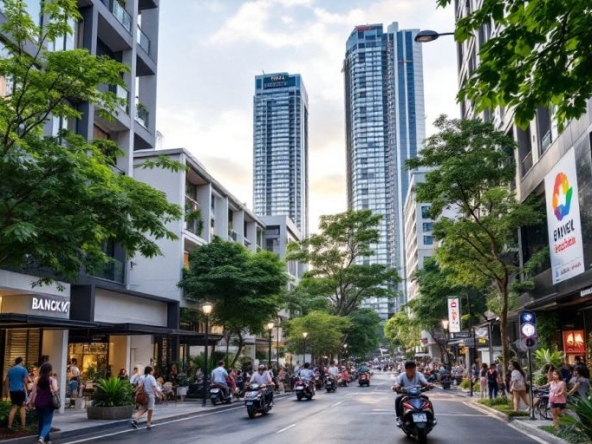The real estate market in Koh Samui is a unique blend of opportunities and challenges, shaped by various factors including tourism, economic conditions, and government policies. As we look towards 2024, understanding these elements will be crucial for anyone considering investment in this tropical paradise.
Key Takeaways
- Koh Samui’s real estate market is influenced by its appeal as a tourist destination, drawing both foreign and local buyers.
- The demand for luxury properties, especially villas and beachfront condos, continues to rise, reflecting the island’s high-end market.
- Infrastructure improvements are expected to enhance property values and attract more investors to the island.
- Government policies regarding property ownership and taxation will play a significant role in shaping the market in 2024.
- Despite potential challenges, such as global economic fluctuations, the overall outlook for Koh Samui’s real estate market remains positive.
Understanding the Samui Real Estate Market Dynamics
The Samui real estate market is shaped by various local dynamics, economic factors, and legal considerations. Understanding these elements is crucial for potential investors and buyers.
Local Market Influences
- Tourism Appeal: Koh Samui is renowned for its stunning beaches and vibrant culture, making it a prime location for holiday homes and short term rentals.
- Limited Land Availability: The island’s geographical constraints lead to a unique market where demand often outstrips supply, particularly for luxury properties.
- Expatriate Demand: An influx of expatriates seeking a tropical lifestyle has increased the demand for residential properties.
Economic Factors
- Tourism as a Key Driver: The local economy heavily relies on tourism, which directly influences property values and rental yields.
- Market Resilience: Despite global economic fluctuations, the Samui market has shown resilience, bouncing back as conditions improve.
- Interest Rates: Moderate interest rates in Thailand can enhance buying power, stimulating demand in the real estate sector.
Legal Considerations
- Property Ownership Laws: Foreigners face restrictions on land ownership, typically being allowed to own condominiums or lease land.
- Taxation Policies: Changes in property tax laws can significantly impact investment decisions and market dynamics.
- Zoning Regulations: Local zoning laws dictate what can be built and where, influencing the types of properties available.
The Samui real estate market offers unique opportunities, but understanding the local dynamics and legal framework is essential for navigating potential challenges.
Tourism’s Impact on Samui Real Estate
Tourism as an Economic Driver
Tourism is the backbone of Koh Samui’s economy, significantly influencing the real estate market. The island attracts millions of visitors each year, which boosts the demand for various types of accommodation. This demand has led to a rise in property values, particularly for those suited for holiday rentals. The allure of properties like the 4-bedroom beachfront villa priced at 26,500,000 THB exemplifies the high-end market that thrives on tourist interest.
Seasonal Trends
The real estate market in Samui experiences seasonal fluctuations, with peak tourist seasons driving up rental prices and property demand. During the high season, typically from November to April, property values can increase by as much as 20%. Conversely, during the low season, prices may stabilise or even decrease slightly. This cyclical nature of tourism impacts both short-term rental markets and long-term property investments.
Future Tourism Projections
Looking ahead, projections indicate a steady increase in tourist arrivals, particularly as global travel restrictions ease. The Thai government has been actively promoting Koh Samui as a prime destination, which is expected to further enhance property demand. Factors contributing to this positive outlook include:
- Continued improvements in infrastructure, such as transportation and utilities.
- The island’s reputation as a luxury destination, appealing to affluent buyers.
- An increase in expatriate residents seeking high-quality living standards.
The interplay between tourism and real estate in Koh Samui creates a dynamic market that is both promising and challenging for investors. Understanding these trends is crucial for making informed decisions in this vibrant landscape.
Luxury Properties in Samui

Koh Samui is renowned for its luxurious real estate offerings, attracting affluent buyers from around the globe. The island’s unique blend of tropical beauty and high-end living makes it a prime location for luxury properties.
High-End Villas
The demand for high-end villas in Koh Samui is significant, with many buyers seeking properties that offer exclusivity and stunning views. Some key points include:
- Price Range: Luxury villas typically range from ฿10 million to over ฿40 million ($281K to $1M).
- Features: Many villas come with private pools, expansive gardens, and breathtaking sea views.
- Investment Potential: These properties are often used for short term rentals, providing strong returns on investment.
Beachfront Condominiums
Beachfront condominiums are also popular among investors. They offer a blend of luxury and convenience, making them ideal for both personal use and rental income. Notable aspects include:
- Location: Properties in high-demand areas like Chaweng and Lamai are particularly sought after.
- Amenities: Many condominiums feature modern facilities such as gyms, pools, and direct beach access.
- Market Trends: The market for beachfront condos is expected to grow as tourism continues to rebound.
Premium Amenities
Luxury properties in Samui often come with premium amenities that enhance the living experience. These may include:
- Private Pools: Essential for a luxury lifestyle, offering privacy and relaxation.
- Spa Facilities: Many villas include spa services or facilities for personal wellness.
- Gourmet Kitchens: High-end kitchens equipped with modern appliances for culinary enthusiasts.
"Koh Samui’s real estate market is unique, with a focus on villas rather than high-rise condominiums, ensuring a more exclusive living experience."
In conclusion, the luxury property market in Koh Samui is thriving, driven by a combination of stunning natural beauty, high demand for exclusive living spaces, and the potential for lucrative short term rentals. Investors looking for the best luxury villa in Thailand will find Koh Samui to be an attractive option.
Infrastructure Developments and Their Effects
Transportation Improvements
Recent enhancements in transportation infrastructure on Koh Samui have significantly improved accessibility. These upgrades are expected to attract more tourists and investors, leading to a potential increase in property values. Key developments include:
- Expansion of the airport to accommodate larger aircraft.
- Upgrades to local roads, making travel easier and faster.
- Introduction of new ferry services connecting to the mainland.
Utility Enhancements
The local government has also focused on improving utilities, which is crucial for both residents and businesses. Enhanced utilities can lead to:
- Increased reliability of water and electricity supply.
- Better waste management systems.
- Improved internet connectivity, catering to the growing number of remote workers.
Impact on Property Values
As infrastructure improves, the demand for real estate in Koh Samui is likely to rise. A recent report indicated that properties near newly developed areas have seen a 15% increase in value over the past year. However, it is essential to consider potential risks, such as:
- Environmental concerns related to overdevelopment.
- Political instability affecting investment confidence.
- Global economic fluctuations impacting tourism and property demand.
The ongoing infrastructure developments in Koh Samui are set to enhance the island’s appeal, making it a more attractive destination for both buyers and investors. However, careful consideration of the associated risks is crucial for sustainable growth.
Government Policies and Real Estate
Property Ownership Laws
In Thailand, property ownership laws are crucial for both local and foreign investors. Foreigners are generally prohibited from owning land outright, but they can lease land and purchase condominiums under certain conditions. This legal framework aims to balance foreign investment with local interests, ensuring sustainable development on the island.
Taxation on Real Estate
Recent changes in taxation laws have also impacted the real estate market in Koh Samui. Adjustments to property taxes and transaction fees can influence investment decisions. For instance, the government has introduced low-interest loans and subsidies for first-time buyers, which may increase demand for properties. These initiatives are designed to make homeownership more accessible, particularly for lower-income individuals.
Environmental Regulations
The growing trend towards eco-friendly real estate is reflected in government policies that encourage sustainable development. Buyers are increasingly interested in properties that align with environmental consciousness. The government supports this shift by promoting regulations that favour green building practises and sustainable land use.
"The Eco-Friendly Real Estate Trend is a sign of a larger worldwide movement towards environmental consciousness."
Summary of Key Points
- Foreign ownership restrictions: Foreigners can lease land but not own it outright.
- Tax incentives: Recent tax changes aim to stimulate the market and support first-time buyers.
- Sustainability focus: Government policies are increasingly favouring eco-friendly developments.
Conclusion
Understanding the legal landscape is essential for anyone looking to invest in Koh Samui’s real estate market. Staying informed about government policies and regulations can help investors navigate potential challenges and seize opportunities in this vibrant market.
Economic Stability and Real Estate Growth
Current Economic Conditions
Koh Samui’s real estate market is closely tied to the overall economic stability of Thailand. The island has seen a steady demand for both residential and vacation properties, driven by its appeal to expatriates and tourists. Recent reports indicate that property prices have either stabilised or increased, depending on the type and location of the property. For instance, luxury villas and high-end condominiums, particularly those with ocean views, are experiencing the highest growth in prices.
Projected Economic Growth
Looking ahead, the economic forecast for Koh Samui appears positive. The island’s popularity as a tourist destination suggests that demand for real estate will continue to rise. However, potential investors should remain cautious, as the market is sensitive to global economic conditions and tourism trends.
Impact on Real Estate Prices
The interplay between economic stability and real estate growth can be summarised as follows:
- Increased demand for luxury properties due to the influx of expatriates and tourists.
- Infrastructure improvements enhancing the island’s attractiveness, leading to higher property values.
- Government policies aimed at stimulating foreign investment, which can further boost the market.
"The resilience of Koh Samui’s real estate market is evident, as it continues to bounce back from economic downturns, driven by its enduring appeal to both tourists and investors."
In conclusion, while the current trends in Koh Samui’s real estate market are promising, potential investors should stay informed about external factors that could influence future growth.
Comparing Samui to Other Thai Real Estate Markets
Bangkok vs. Samui
When comparing the real estate markets of Bangkok and Samui, it is essential to note that Bangkok is a bustling metropolis with a diverse range of properties, while Samui is renowned for its luxury villas and tranquil lifestyle. The average property prices in Bangkok tend to be lower than those in Samui, particularly for high-end properties. However, Bangkok offers a wider variety of investment opportunities, including commercial real estate and high-rise condominiums.
Phuket vs. Samui
Phuket, another popular tourist destination, shares similarities with Samui in terms of luxury offerings. However, Phuket’s real estate market is more developed, with a broader range of amenities and services. Properties in Phuket can be more expensive, especially in prime locations, but Samui’s unique charm and natural beauty often attract buyers looking for a more serene environment. The demand for beachfront properties in both locations remains high, but Samui’s limited land availability can drive prices up.
Other Regional Comparisons
In comparison to other regions like Hua Hin and Pattaya, Samui stands out due to its exclusive beachfront villas and high-end lifestyle appeal. While Hua Hin offers more affordable options for retirees and families, Samui’s market is primarily driven by luxury tourism and expatriate demand. The following table summarises the average property prices in these regions:
| Region | Average Price (THB) | Property Type |
|---|---|---|
| Bangkok | 3,000,000 | Condominiums |
| Phuket | 5,000,000 | Villas |
| Samui | 9,900,000 | Beachfront Villas |
| Hua Hin | 2,500,000 | Bungalows |
| Pattaya | 3,500,000 | Apartments |
In conclusion, while Koh Samui offers a unique and luxurious real estate market, it is essential for potential investors to consider the differences in property types, pricing, and market dynamics when comparing it to other Thai regions. Understanding these factors can help investors make informed decisions in this competitive landscape.
Demographic Shifts and Real Estate Demand
Expatriate Influx
Koh Samui is witnessing a significant influx of expatriates, drawn by the island’s appealing lifestyle and job opportunities in the tourism sector. This trend has led to a heightened demand for residential properties, particularly those suitable for long-term living. Properties that cater to expatriates often include furnished apartments and houses with homely amenities.
Domestic Migration
In addition to expatriates, there is a noticeable trend of domestic migration towards Koh Samui. Many individuals from mainland Thailand are relocating to the island, seeking a better quality of life. This shift is contributing to the demand for various types of properties, including vacation homes and investment properties. The growing interest in property ownership among domestic migrants is reshaping the real estate landscape.
Population Trends
The demographic landscape of Koh Samui is evolving, with an increasing number of retirees choosing to settle on the island. This ageing population is particularly interested in purchasing properties that offer easy maintenance and proximity to healthcare facilities. As a result, there is a rising demand for single-story homes and properties designed for older individuals.
The changing demographics in Koh Samui are not just influencing the types of properties in demand but also the overall character of the community, making it essential for investors to understand these shifts.
Summary of Key Trends
- Increased demand for long-term rental properties due to the expatriate influx.
- Growing interest in eco-friendly and sustainable properties reflecting global trends.
- Rising popularity of smaller, manageable living spaces among younger buyers and retirees.
As these demographic shifts continue to shape the real estate market in Koh Samui, potential investors must remain informed about the evolving needs and preferences of buyers.
Investment Opportunities in Samui

Rental Yields
Investing in Koh Samui offers attractive rental yields, particularly for properties near popular tourist spots. Many investors are drawn to the potential for high returns from vacation rentals. Here are some key points to consider:
- High demand for short-term rentals during peak tourist seasons.
- Properties with ocean views or close proximity to beaches tend to attract more visitors.
- The average rental yield in Koh Samui can range from 6% to 10%, depending on the property type and location.
Long-Term Value
The real estate market in Koh Samui has shown resilience over the years, with property values generally increasing. Factors contributing to this trend include:
- Growing tourism leading to increased demand for rental properties.
- Ongoing infrastructure improvements enhancing accessibility and living conditions.
- A stable legal framework for foreign investors, despite some restrictions on land ownership.
Emerging Investment Areas
Investors should keep an eye on emerging areas within Koh Samui that are gaining popularity. Notable locations include:
- Lipa Noi: Known for its tranquil beaches and luxury villas, this area is becoming a hotspot for high-end investments.
- Maenam: Offers a mix of affordable properties and luxury developments, appealing to both local and foreign buyers.
- Bophut: With its vibrant community and tourist attractions, Bophut is ideal for those looking to invest in rental properties.
Investing in Koh Samui’s real estate market presents unique opportunities, but it is essential to conduct thorough research and understand the local dynamics before making a decision.
In conclusion, Koh Samui remains a promising destination for real estate investment, particularly for those seeking rental income and long-term value. The island’s natural beauty, coupled with its growing infrastructure, makes it an attractive option for both local and foreign investors. A luxury villa with renewable energies can be a perfect example of a property that combines elegance with sustainability, appealing to the modern investor.
Challenges Facing the Samui Real Estate Market
The Samui real estate market faces several challenges that could impact its growth and attractiveness to investors. Environmental concerns are at the forefront, particularly regarding the effects of overdevelopment on the island’s natural beauty. This could deter potential buyers and investors who value the island’s pristine environment.
Global Economic Factors
- Economic Fluctuations: Global economic changes can directly affect the demand for real estate in Samui. For instance, downturns in major economies can lead to reduced tourism, which is a significant driver of the local market.
- Political Instability: Any political unrest in Thailand may create uncertainty, making investors hesitant to commit to property purchases.
- Market Comparisons: The Phuket Real Estate Market often competes with Samui, and shifts in investor interest towards Phuket could impact Samui’s market.
Health Crises Impact
- The COVID-19 pandemic has shown how vulnerable the real estate market can be to health crises. Travel restrictions and health concerns can lead to a significant drop in tourism, which in turn affects property demand.
- The recovery from such crises can be slow, and potential investors may remain cautious.
Environmental Concerns
- Overdevelopment poses a risk to the island’s natural charm, which is a key selling point for many properties. If the island loses its appeal, it could lead to a decline in property values.
- Sustainable development practises are essential to maintain the balance between growth and environmental preservation.
The key to navigating these challenges lies in understanding the local market dynamics and remaining informed about external factors that could influence property values and investment opportunities.
Future Trends in Samui Real Estate
Market Predictions for 2024
The Koh Samui real estate market is expected to continue its upward trajectory in 2024. The island’s allure as a tropical paradise remains a significant draw for both local and international buyers. Recent trends indicate that properties, particularly luxury villas and high-end condominiums, are experiencing a surge in demand. This is largely due to the island’s appeal as a holiday destination and the increasing number of expatriates seeking permanent residence.
Long-Term Outlook
Looking beyond 2024, the long-term outlook for Samui’s real estate market appears promising. The combination of improved infrastructure, such as enhanced transportation and utility services, is likely to boost property values. Additionally, the trend towards sustainable living is gaining traction, with more buyers showing interest in eco-friendly homes.
Potential Market Shifts
As the market evolves, several shifts may occur:
- Increased demand for smaller, low-maintenance properties: Younger buyers and foreign investors are leaning towards manageable living spaces.
- Growth in rental properties: With tourism on the rise, investment in properties with strong rental potential is becoming more attractive.
- Focus on luxury and premium amenities: Properties like the luxury 6 bedrooms stunning sea view villa are prime examples of what buyers are seeking.
The Koh Samui real estate market is poised for growth, driven by a combination of local demand and international interest. Investors should remain vigilant and informed about market dynamics to make the most of emerging opportunities.
As we look ahead, the Samui real estate market is set to evolve with exciting new trends. With a growing interest in eco-friendly homes and smart technology, buyers are keen to invest in properties that offer sustainability and modern conveniences. If you’re curious about these emerging opportunities, visit our website to explore the latest listings and find your perfect home in Samui!
Conclusion
In summary, the real estate market in Koh Samui presents a unique blend of opportunities and challenges for potential investors. The island’s charm as a tropical getaway, coupled with its limited land availability, creates a distinctive market environment. While tourism remains a key driver of the local economy, it also makes the market sensitive to global trends. As we look ahead, the forecast appears optimistic, yet it is essential for investors to stay informed about potential changes in government policies and economic conditions. The ongoing development of infrastructure and the influx of expatriates further enhance the appeal of Koh Samui’s properties. However, caution is advised, as external factors could influence market dynamics. Overall, Koh Samui continues to be an attractive option for those seeking investment in a vibrant and evolving real estate landscape.




